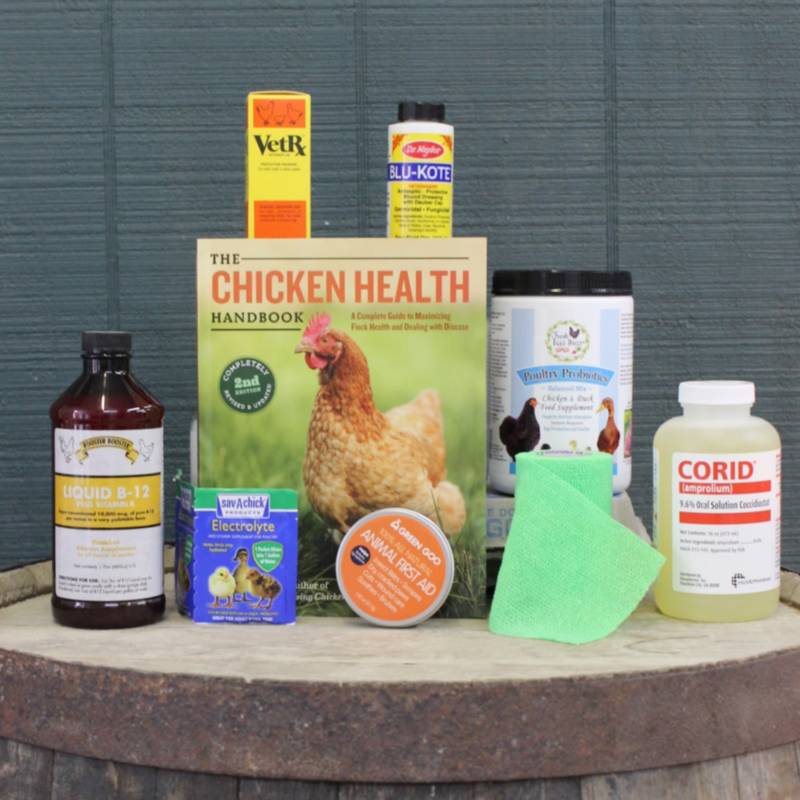Coccidiosis - The Homesteader's "C" Word
Coccidiosis in Chickens: What It Is, What Causes It, and How to Prevent It
Coccidiosis is a common but potentially deadly disease that affects chickens, especially young or stressed birds. If you’re raising chickens, it’s crucial to understand what coccidiosis is, how it spreads, and what you can do to keep your flock healthy.
Note: Coccidiosis can affect other animals on your farm too - not just chickens
What Is Coccidiosis?
Coccidiosis is a parasitic disease caused by microscopic organisms called Eimeria, which infect the intestinal lining of chickens. These parasites disrupt the bird's ability to absorb nutrients, leading to symptoms like lethargy, diarrhea (sometimes bloody), weight loss, and in severe cases, death. There are several species of Eimeria, and not all are equally harmful. However, even a mild infection can stunt a bird’s growth and impact overall flock productivity. The disease progresses quickly and can wreak havoc on your flock if left unchecked.
What Causes Coccidiosis?
Coccidiosis occurs when chickens ingest oocysts (the parasite’s eggs) from contaminated soil, litter, feed, or water. These oocysts are incredibly hardy and can survive for long periods in the environment, waiting for the right conditions to thrive. Once ingested, the oocysts hatch in the gut and begin damaging the intestinal lining. This damage leads to the disease’s telltale symptoms, with young chicks and stressed birds being the most susceptible.
How Common Is Coccidiosis?
Coccidiosis is one of the most common diseases in chickens. Nearly every flock encounters the parasite at some point, but not every exposure leads to an outbreak. Whether or not coccidiosis becomes a problem depends on the balance between the parasite’s presence and the birds’ immunity. Chickens gradually build immunity to Eimeria over time when exposed to small, manageable doses of the parasite. This is why chicks are more at risk than adult birds—they haven’t had time to develop resistance yet.
When and Why Does Coccidiosis Flare Up?
Coccidiosis thrives in certain conditions. Here are the main factors that can trigger an outbreak:
- Warm, Wet Conditions: Oocysts need moisture and warmth to sporulate and become infectious. Wet bedding, spilled water, or humid weather creates the perfect environment for the parasite.
- Crowding: Overcrowding increases stress, weakens immune systems, and forces birds to interact with contaminated litter more frequently.
- Poor Sanitation: Dirty coops, waterers, and feeders allow oocysts to accumulate and spread.
- Stress: Any form of stress, such as moving birds to a new environment, handling, or extreme weather, can weaken a chicken’s immune system and make it more susceptible to coccidiosis.
- Young Chicks: Chicks under eight weeks old are especially vulnerable because they haven’t had time to develop immunity.
- Nutritional Deficiencies: A poor diet can weaken a bird’s immune system, making it harder to fight off infections.
How Dangerous Is Coccidiosis?
Without intervention, coccidiosis can quickly become deadly. Severe cases lead to dehydration, malnutrition, and secondary infections that can kill birds within days. Even mild cases can cause long-term damage, including stunted growth and reduced egg production.
Prevention and Management
The good news is that coccidiosis is preventable with a little planning and attention to detail. Here’s how you can reduce the risk in your flock:
- Keep Bedding Dry: Replace wet or soiled bedding promptly to reduce moisture in the coop.
- Practice Good Sanitation: Clean waterers, feeders, and coops regularly to minimize the spread of oocysts.
- Avoid Overcrowding: Give your birds enough space to reduce stress and limit exposure to contaminated litter.
- Feed a Medicated Starter: Chick starter feeds often contain coccidiostats, which help prevent coccidiosis by limiting the growth of Eimeria in the gut.
- Introduce Birds Gradually: Let young birds build immunity naturally by exposing them to small, manageable doses of the parasite in their environment.
- Use Probiotics and Vitamins: Boost your flock’s gut health and immune system with supplements during stressful periods.

Treating Coccidiosis
If you suspect coccidiosis, act fast. Medications like amprolium (sold under brand names like Corid) can stop the disease in its tracks. Always follow dosing instructions carefully, and consult a veterinarian for severe outbreaks or if you’re unsure about diagnosis.
Final Thoughts
Coccidiosis is a serious threat to backyard flocks, but it’s manageable with good husbandry practices. By understanding the conditions that lead to outbreaks and taking steps to prevent them, you can keep your birds healthy and thriving. A little effort now can save you a lot of heartache later. Keep an eye on your flock, stay vigilant, and don’t let coccidiosis catch you off guard!